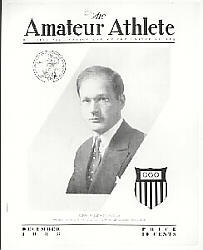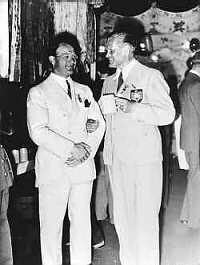|
|
In Favor of Participation
|
|
|
Avery Brundage, president of the American Olympic Committee, fought to send a U.S. team to the 1936 Olympics, claiming: "The Olympic Games belong to the athletes and not to the politicians." He wrote in the AOC's pamphlet Fair Play for American Athletes that American athletes should not become involved in "the present Jew-Nazi altercation." As the Olympics controversy heated up in 1935, Brundage alleged the existence of a "Jewish-Communist conspiracy" to keep the United States out of the Games.
On December 8, 1935, the Amateur Athletic Union defeated the proposal to boycott the Olympics by 2.5 votes. Avery Brundage maneuvered the vote to achieve a victory. President Franklin D. Roosevelt never become involved in the boycott issue, despite warnings from high-level American diplomats regarding Nazi exploitation of the Olympics for propaganda. Roosevelt continued a 40-year tradition in which the American Olympic Committee operated independently of outside influence.
Many major American newspapers, including The New York Times, favored a boycott. Support grew after the announcement in fall 1935 of the Nuremberg laws, which stripped German Jews of their citizenship and prohibited them from marrying or having relations with "Aryans."
|

 The Amateur Athlete The Amateur Athlete was the official publication of the American Olympic Committee. This December 1933 issue featured an article on the Olympics controversy. —USHMM #14933/University of Illinois Archives, Champaign-Urbana, Illinois
|
|

 Brundage is shown at a pre-Olympics reception with a close German friend, Karl Ritter von Halt of the International Olympic Committee. A member of the Nazi Party, Ritter von Halt escorted Brundage during his 1934 investigation into the situation of Jewish athletes. Berlin, Germany, July 1936. —USHMM #89402/Ullstein Bilderdienst
|
|
|
The Museum’s exhibitions are supported by the Lester Robbins and Sheila Johnson Robbins Traveling and Special Exhibitions Fund, established in 1990.
|
